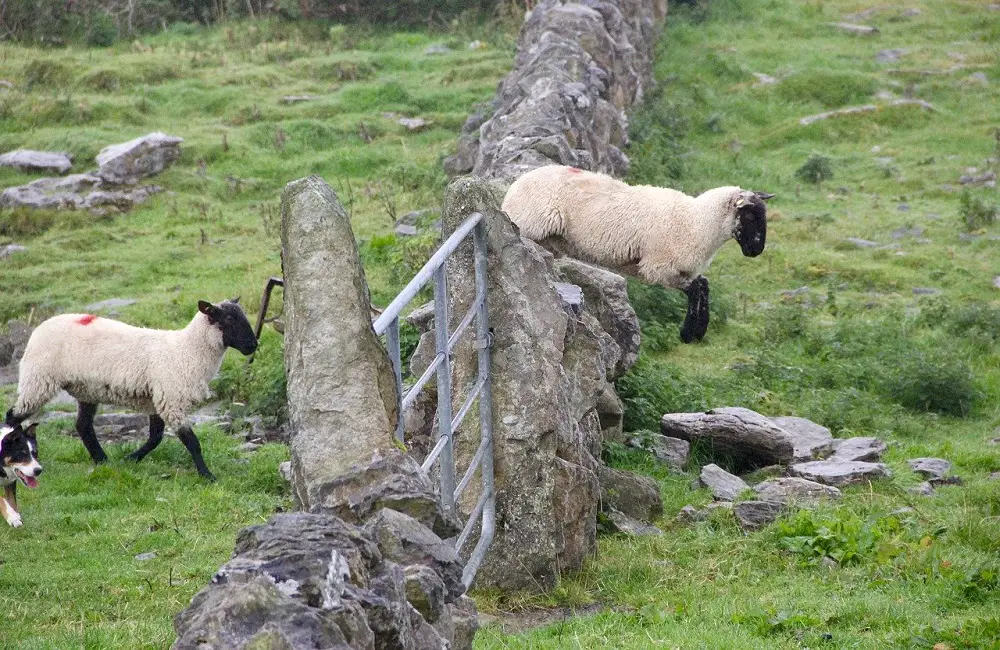Sheep are vulnerable animals. They are an easy target for predators such as wolves, coyotes, and foxes. In the Christian bible, sheep are famous. It shows in the bible that sheep are gentle, meek, quiet, shy, and obedient animals, which is true since the bible is considered as a history book, which means all written there are documented by real people.
If sheep are quiet, meek, and gentle, can they defend themselves from predators as other prey do? Do sheep obey their predator by letting their predator eat them? Or do they fight back or run away? Let us find out.
Can sheep defend themselves? Sheep have little ability to defend themselves. If they are compared to other prey animals kept as livestock, sheep are the weakest. The only thing sheep can do to avoid dying at the hands of their predator is to run or stay with their flock.
There are other things you might want to know about these cute, fluffy, and gentle creatures. I am going to tell you the different ways sheep do defend themselves from their predators. Also, I will list down the various animals that love to eat sheep. If you are ready to learn more about sheep, let us move on!
How Do Sheep Defend Themselves?
Sheep are naturally prey animals. They are gentle, fluffy, and meek creatures that love to live in groups called flocks. Because of their gentleness and vulnerability, sheep are very prone to predators. Sheep attract predators very often.
Sheep react to situations that they are placed according to their instincts. People said that it has developed over time. Domestication is the reason for the sheep’s decreased instinctive behavior, the majority of the people say.
Like I have mentioned above, sheep have a subtle way of defending themselves. Sheep have no horns, sharp teeth, strong legs, and sharp claws. All they have is their fluffy bodies. So having no scary thing attached to their bodies, how do sheep defend themselves from their terrifying predators?
Below are the three ways sheep defend themselves from their predators.
Gregariousness
Sheep are social animals. They will stay together to protect themselves from possible threats. It is the reason why sheep follow each other around many times.
But sheep will maintain a flight distance between themselves and other sheep. They will move away if they sense that their distance between other sheep is getting shorter. Sheep will switch to full flight if their fellow sheep keep moving towards them.
This kind of behavior and their dependence on each other is clearer in groups of at least four to five sheep and there is one leader that they follow. This instinct of sheep is so strong!
They can get stressed and anxious if they have been separated from their flock. That is why many sheep owners tend to buy at least five sheep. Isolating them may lead to catastrophe.
Once a flock sees a predator, they will gather themselves. They don’t leave their group when there is a predator because they are more likely to succumb to an attack when they are on their own.
Sheep will run away together from predators, and after that, they will gather around, making use of their natural instinct to stay together for safety. It is an awesome defense mechanism!
Sheep have good eyesight, powerful hearing, and a sense of smell. It helps them to detect predators quickly so that they can run and gather together immediately. Sheep can detect hyenas, foxes, and coyotes from 1,200 to 1,500 yards away.
Sheep Avoid And Flee Away
When sheep see a fox or coyote, they are more likely to use avoidance and rapid flight to avoid that predator. It is the natural instinct of sheep. The flight behavior of sheep is the stimulus bringing out the scary instinct of coyotes and foxes.
Free-range sheep are more adept when it comes to avoiding predators. However, it is different for domesticated sheep that depend solely on men or dogs for their protection. If predators invade a flock of domesticated sheep and the flock has no guard dogs, it is an easy meal for foxes and coyotes.
Domesticated sheep should not run away. Instead, they should form a group. The bigger the group, the fewer chances one of them will die.
Rams are large sheep, and some of them have horns. Even though you have them on your farm, they will not protect their fellow sheep because they only protect themselves. Yes, rams never defend the group and even their own offspring. Coyotes that help each other will quickly overcome a ram.
However, even though rams are useless since they only protect themselves, a flock has a better defender. In every flock, there is one dominant female that will lead her flock to new grazing areas and back to their shelter at the end of the day. The queen will go to the highest spot available in the area to look out for any threat.
If a predator or the guard dog tries to approach the flock, the female dominant sheep will move between the intruder and her flock. She will face the threat like a man and stamp her foot as her warning. Ewes may also charge the intruder if their escape plan failed.
The warning stomp of ewes will be repeated once or twice but will have action if the intruder doesn’t retreat. Ewes will lower her head and charge the threat.
Even though they have no horns like rams, the queen has a low center of gravity, a heavy mass, and determination to protect her flock. Most predators are not scared with that, but the guard dogs will immediately back out after one charge and go back to sleep.
With The Help Of Their Friend Dog
Like I have said above, sheep have no good fighting skills that leave them vulnerable to predators. Over time, farmers started to use dogs as the guardians of the flock.
Sheepdogs are effective in terms of protecting sheep from predators. However, one sheepdog is not that effective. Three to five sheepdogs will surely make the flock safe!
Guard dogs can effectively protect sheep from any predator. They can reduce the number of sheep that have died because of predators. Guard dogs can be used to move sheep from one pasture to another and separate one sheep from the flock.
Because sheep have lots of natural predators, guard dogs have been known to help farmers prevent their sheep from dying at the hands of their predators.
Aside from dogs, llamas and donkeys can also become the guardian of the sheep because they stay with the sheep without hurting them and aggressively push predators away.
Animals That Prey On Sheep
Because of these predators, lots of sheep are dying, which affects the business of farmers. These predators can also be called pests. Who are the predators of sheep? Let us find out!
The common predators of sheep are wild dogs. Some of their predators of sheep harass and kill strong and healthy stock for fun rather than for food. One of their predators is foxes that attack healthy sheep that causes high stock losses. Wild birds like eagles can also kill sheep.
That is the reason why farmers have their own guns. However, some of the predators cannot be shot by farmers because they are considered endangered. The predators are eagles, Mexican and red wolves, and grizzly and black bears.
It is essential to implement steps that prevent predation, especially if this business is your only source of income. Predators are pests to the sheep farm. They are the reason why many sheep losses all over the world.
However, not all sheep farmers have the same problem. It depends on the geographic location and regions of the farm. If the farm is near the habitat of foxes and coyotes, expect that there will be some pests around. But if the location of the farm has no predators around, then the farmer is lucky.
Some farmers that lose lots of sheep may liquidate the flock or produce hardly. However, even though your area has very few predators, it is still essential to execute steps that prevent predation.
Final Thoughts
Sheep defend themselves by avoiding or running away from their predators, gathering, or with the help of a guard dog. Aside from their dog friends, llamas and donkeys can also prevent predators from killing your sheep.
Farmers need to remember that predators are not the only reason why their sheep die. Their attention should not be limited to controlling the predators. Why? Some sheep may perish because of diseases, and they get lost because they get drowned in the river near the farm or lost because they wander too far.
Source: sheep101.info, bbc.com





